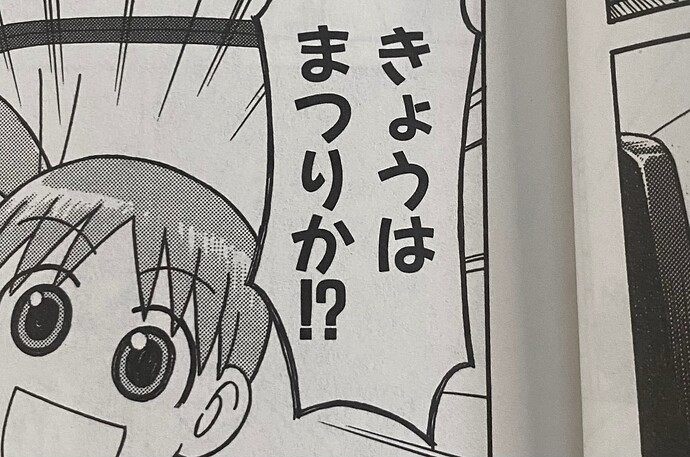No problem at all if your page count is a little off! Some pages don’t have the page numbers written on them in manga, so you sometimes have to go a few pages before finding the number. If you’re unsure if you are too far ahead/too far behind, just put your question/comment inside a ‘hide details’ balloon and say that you weren’t sure of the exact page number, but have a question about character (A) saying xyz close to page ~.
Just finished up the portion for today! Idk why but the big panel with ジャンボ made me laugh out loud. This thread already proving to be very effective hehe, every question I had was more or less covered here before I got around to reading.
My confusions
I have seen the usage of な as an emphatic ending particle plenty but for some reason it always feels so wrong to read lol.
そういや for そういえば . I haven’t even leared that grammar point yet so I would’ve been very lost on the colloquial version without the previous input here hehe.
手ぇふった really tripped me up cause I was reading it as a set phrase rather than a noun and a verb ;_;
I’m bad with character names and so the section where she told トーさん to wave too had me really confused for a second, like why are u using an imperative to talk about your own hand waving yotsuba
どこってそりゃおまえ still has me a little confused, I understand the translation given above but have not totally pieced together how the individual parts of the sentence get us there.
Anyways really excited to keep this going! It’s a fun supplement to my usual nhk easy readings.
I’ve got one thing on the top of page 8 I’d love if someone could confirm (or correct) my understanding:
とーちゃん「あんまりのり出すと危ないぞー」
The 「あんまり」here, is it the same as 「あまり」?
Yes, that is so.
As I understand it, とーちゃん says ‘Hey! It is dangerous to lean forward too much!’ (意訳).
yep, it is just easier to say.
Yes. Some people pronounce it one way or the other, but they are exactly the same. I’m not completely sure, but I think あんまり might be a Kansai dialect thing.
Is there a festival today!?
Ohhhhhh so that says 「今日はまつりか」I was reading the “う” as a backwards “と” lol. I thought maybe she was mispronouncing a word I didn’t understand well enough or something.
Just checking in to say I’ve done my first 5 pages. <3
Oh that’s so cute, I’m not familiar with the series and I didn’t think to look up the meaning of her name
Well this is pretty cool. A few months ago I had decided to postpone my reading because it was too hard, but the Bunpro grammar decks and the discussions here helped quite a bit! I can now say that I have read the first few pages of native material :D!
I also wanted to share a YouTube video I found where a guy reads the text and then explains what all the slang means, so hopefully it will help somebody!
My copy should be arriving in a few days so I can join in reading!
My colleagues think it’s adorable I’m reading よつばと 
I had similar reactions from my Japanese friends haha.
On the side note, I am glad that this thread was created. I’ve been planning for a while to read よつば, but I only read couple of pages so far. I am more than happy to follow along as well.
Hello, I hope everyone’s doing good! I’ve got a couple of questions on pg.13:
片づけてろ - This looks like it could be the imperative form of 片付ける, but wouldn’t that be 片付けろ? Where does the extra て come from?
持ってくんなよ - I was able to find that 持ってくis the abbreviated form of ‘持ってくる’, but I’m unsure about the rest of the expression. Is the ん from explanatory んだ?The な the sentence ending particle ‘do not’? And よ the emphasis sentence ending particle?
I’m also just a beginner in Japanese but I think I can answer your questions (please correct me if I’m wrong, more experienced learners!)
-
片づけてろ is a colloquial abbreviation of 片づけていろ which is the continuous form.
-
持ってく is short for 持ってくる, you’re right that the ん is to make it explanatory, な is indeed the strong particle meaning “do not”, and よ is the emphatic particle as you said.
HI!
In page 11:
- when とーちゃん says ‘ヤンダは? まだ?’, he is asking if someone named Janda has not still arrived?
- Then, what is the expression that Janbo uses in the reply, 用が入ったから, that Janda is busy with something else?
- ‘こねぇって’ would be that he (Janda) said he wouldn’t come, right?
- the bottom right frame is a usage of the ない内に grammar point.
- Finally, what is the しな after 働く expressing in ‘ジャンボが二人分働くしな’?
I just have to say, よつばと is a fantastic choice.
I found it to be a huge help kick starting my reading. This manga plus NHK Easy will pull you through that beginner’s reading agony and teach you so much.
よつばと starts out somewhat low difficulty, but as the manga progresses, you’ll start to see more specialized language, such as when Yotsuba goes to the ranch. Before you know it, you’re learning all the essential words about farm animals, for instance. The manga grows with you.
And it’s genuinely funny at times, good humor can be too hard to come by in newer manga… Hope you guys enjoy it.
It’s the continuous + imperative stacked together iirc かたづけている to abbreviated かたづけてる (removing い is is common) then changing the るto ろ.
Also unless I’m mistaken (someone correct me I’ve just woken up lol) もってくんなよ is もってくるな! As in don’t bring! (な in this case is prohibitive). You’ll often seeる replace by ん colloquially too

